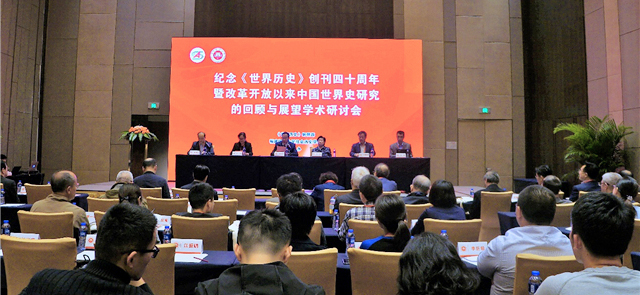Establishing a Chinese school of world history

The 40th Anniversary of the Publication of World History and the Academic Symposium on the Retrospect and Prospect of World History Studies in China Since China’s Reform and Opening-up was recently held at Fujian Normal University. Photo: CSSN
The 40th Anniversary of the Publication of World History and the Academic Symposium on the Retrospect and Prospect of World History Studies in China Since China’s Reform and Opening-up was recently co-held by the editorial office of World History and the School of Social Development at Fujian Normal University.
Scholars of world history studies in China have made innovative progress since the nation’s reform and opening-up. Wang Xiaode, a professor of history from Fujian Normal University, said that world history studies in China have embraced great change in this time. In terms of method used to obtain materials for study, there has been no difference between Chinese scholars and foreign scholars. The expansion of material has no doubt broadened the choice of topics and research approaches, and the exploration of new fields of study will continue to be a major characteristic of future world history studies in China. Ever since world history became a level-one discipline in China in 2011, the system for training scholars of world history studies in China has been further improved, he said.
Li Jianming, a professor of history from Fudan University, said that three types of world history studies in China have come into being. First, in some international fields, such as classical studies and Egyptology, scholars tend to study in European countries and the United States and then come back to do research in China. They constitute a major part of the group of scholars who concentrate on these fields.
In historical studies of individual countries including African, Latin American and Southeast Asian countries, the scholars from Europe and the United States started their studies far earlier than their Chinese counterparts and have made prominent achievements. That is to say, they have established the paradigm and model for studies in these fields, and Chinese scholars still have a long way to go before they can gain notable influence, he said.
Last of all, Western Europe, the US, Russia and Japan all have their own profound traditions of historical studies. In most cases, the academic achievements of their own scholars lead the international trends in the study of their histories. Hence, scholars from other countries, including China, face difficulty having an influence in those fields, Li said.
Take historical studies of the United States, for example. Li suggested that if Chinese scholars can both pay attention to the frontier of historical studies in the United States and gain understanding in Chinese historical studies, it would be promising, because Chinese scholars would have made influential achievements in increasing topics. In such traditional fields as political history, diplomatic history and economic history, Chinese scholars should raise penetrating questions through new approaches and new perspectives. In addition, Chinese scholars should make more attempts in relatively new fields including social history, cultural history, urban history, environmental history, medical history, intellectual history and disciplinary history, he suggested.
Hou Jianxin, a professor of history from Tianjin Normal University, suggested that even after 40 years of development, the world history studies discipline in China still faces the problem of insufficient researchers and small research volume, which does not match China’s international status and social demands. Hou said that there has been a more specialized and detail-focused trend in relevant research fields. He suggested that Chinese scholars of world history studies should continue to focus on major theoretical and practical problems and dedicate themselves to serving China’s national strategies.
Meng Guanglin, a professor of history from Renmin University of China, suggested that Chinese scholars should uphold the materialistic concept of history and include and integrate other theoretical approaches introduced from abroad. In this way, Chinese scholars can establish China’s system of theoretical approaches for world history studies. By supporting the academic self-identity of the Chinese world history community, a Chinese school of world history studies can be established, he said.
(edited by CHEN ALONG)
